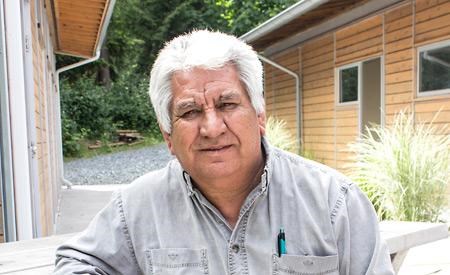When Prime Minister Stephen Harper made his apology on behalf of the federal government in 2008 to the victims of Canada’s residential schools, many first nations people were shocked.
Not because they did not expect the federal government to own up and recognize the role it played in maintaining those institutions, but because the stories of the survivors had yet to be told.
On June 2, Justice Murray Sinclair presented the Truth and Reconciliation Commission’s (TRC) report and 94 recommendations, after spending six years combing through church records and gathering the stories of anyone affected by the residential schools. The commission has concluded that Canada’s treatment of aboriginal people at the residential schools amounted to “cultural genocide.”
John Louie is a residential school survivor from Tla’amin (Sliammon) Nation who helps other survivors heal from their past experiences.
Starting in 1912, Tla’amin children were first forcibly separated from their parents, under the threat of imprisonment by the RCMP, and sent to the Sechelt Indian Residential School. That school remained open until 1975. If that school was full, then children were sent to St. Mary’s in Mission or Kamloops Indian Residential School.
Louie said that while he was there he faced all manner of abuse. Talking to survivors, he said, it did not matter which school the children were sent to, the stories they shared are similar.
“It was not uncommon to hear kids crying at night, either because they were missing their families or they were hungry,” Louie said. Many children drank water at night to combat their hunger, but then were more prone to wetting their beds and were punished the next morning. “With that punishment was humiliation. They put you right in front of everyone.” He said that at the school he went to children had to carry their soiled sheets in front of everybody.
And then there are the stories of children being molested and raped.
“There was sexual abuse, but who could we tell?” asked Louie.
Students faced psychological trauma in addition to the physical and sexual abuse.
“When you did something wrong, it was a sin,” he said. “When you were abused they said that you were bad and you say ‘I guess I’m going to hell.’ That’s the mindset you have.”
It has been pointed out that the residential schools did not have playgrounds, but they did have cemeteries.
The commission noted the need to have real history brought out and for all Canadians to understand what happened at the schools. One of the 94 recommendations calls for the need to make age-appropriate curriculum on residential schools, treaties and aboriginal people’s historical and contemporary contributions to Canada a mandatory requirement for all grades.
Louie said that the survivors have taken the first steps toward moving forward, but now he feels that the federal government needs to take action and implement the commission’s recommendations.
He added, and many have noted, that this report is just the start for actual reconciliation in the country on the decades-old matter.
“Canada has to learn what it did through those policies,” said Louie, who added that the vast majority of aboriginal people in the country are still living under the Indian Act which governs the relationship between aboriginal peoples and the federal government. “We are still living those policies now.”
Not all of the 94 recommendations are aimed at government. Some call for action by churches and schools to reconcile with first nations people.
The government and people of Canada need to come to terms with past wrong doings, in the same way that those who suffered abuse had to face what happened to them to try to get past it, Louie said.
It took Louie many “dark” years to come to terms with his own experiences and for him to realize that he was not a bad child and he did not need to own his abuse. “The same has to happen for the country,” he said.



